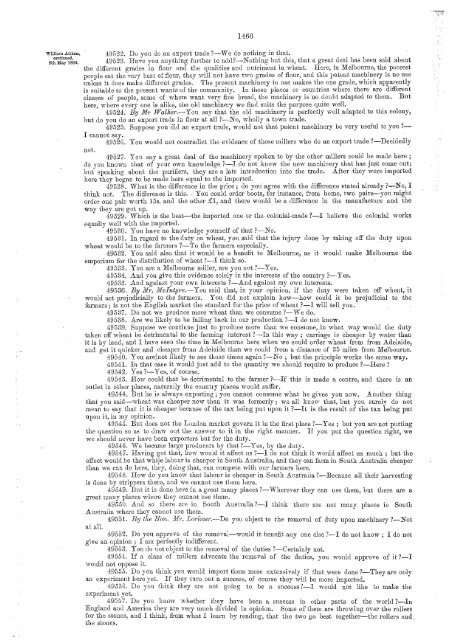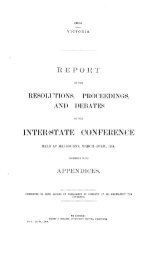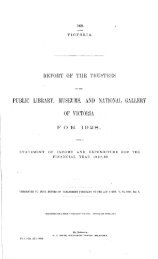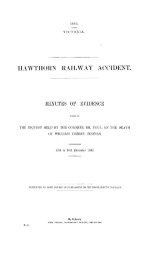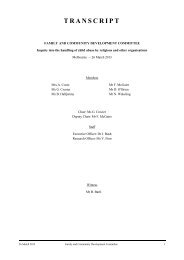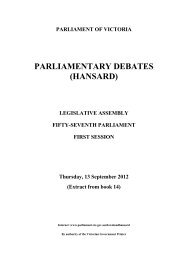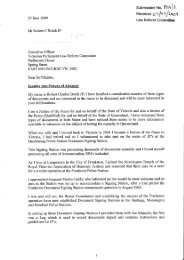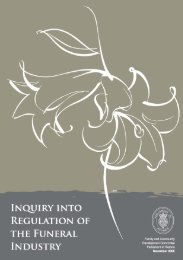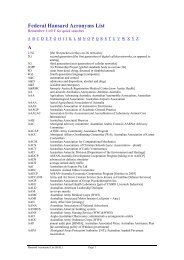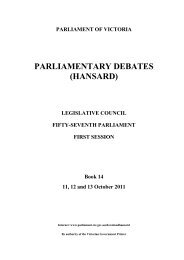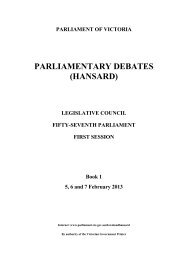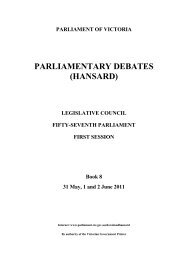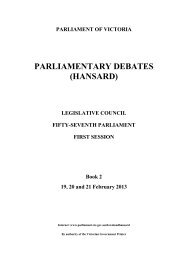Minutes of Evidence p.1401-1509 - Parliament of Victoria
Minutes of Evidence p.1401-1509 - Parliament of Victoria
Minutes of Evidence p.1401-1509 - Parliament of Victoria
Create successful ePaper yourself
Turn your PDF publications into a flip-book with our unique Google optimized e-Paper software.
WUllam Altken,<br />
continued,<br />
8th May 1883.<br />
1466<br />
49522. Do you do an export trade ?-We do nothing in that. .<br />
49523. Ha-ve yon anything further to add?-Nothing but this, that a great deal has been smd about<br />
the different grades in flour and the qualities and nutriment in wheat. Here, in Melbourne, the poorest<br />
people eat the -very best <strong>of</strong> flour, they will not have two grades <strong>of</strong> flour, and this patent mac~nery is no use<br />
unless it does make different grades. The present machinery in use makes the one grade, whteh apparently<br />
is suitable to the present wants <strong>of</strong> the community. In those places or countries where there are different<br />
classes <strong>of</strong> people, some <strong>of</strong> whom want -very fine bread, the machinery is no. doubt adapted to them. But<br />
here, where every one is alike, the old machinery we find suits the purpose quite well.<br />
49524. By Jir Walker.-You say that the old machinery is perfectly well adapted to this colony,<br />
but do you do an export trade in flour at all wholly a town trade.<br />
49525. Suppose you did an export trade, would not that patent machinery be very useful to you?<br />
I cannot say.<br />
49526. You would not contradict the evidence <strong>of</strong> those millers who do an export trade ?-Decidedly<br />
not.<br />
49527. You say a great deal <strong>of</strong> the machinery spoken to by the other millers could be made here ;<br />
do yon known that <strong>of</strong> your own knowledge ?-I do not know the new machir1ery tl:mt has just come out;<br />
but speaking about the purifiers, they are a late introduction into the trade. After they were imported<br />
here they began to be made here equal to the imported.<br />
49528. What is the difference in the price; do yoU: agree >vith the difference stated already ?-No, I<br />
think not. The difference is this. , You could order boots, for instance, from home, two pairs--you might<br />
order one pair worth 15s. and the other £1, and there would be a difference in the manufacture and the<br />
way they are got up.<br />
Ml529. Which is the best-the imported one or the colonial-made ?-I believe the colonial works<br />
equally well with the imported.<br />
49530. You ha-ve no knowledge yourself <strong>of</strong> that ?-No.<br />
49531. In regard to the duty on wheat, you said that the injury done by taking <strong>of</strong>f the duty 11pon<br />
wheat would be to the farmers ?-To the farmers especittlly.<br />
49532. You said also that it would be a benefit to Melbourne, as it would make Melbourne the<br />
emporium for the distribution <strong>of</strong> wheat ?-I think so.<br />
49533. You are a Melbourne miller, are you not ?-Yes.<br />
49534. And you give this evidence solely in the interests <strong>of</strong> the country<br />
49535. And against your own interests ?-And against my own interests.<br />
49536. By .Lltfr. JJiaintyre.-You said that, in your .opinion, if the duty were taken <strong>of</strong>f wheat, it<br />
would act prejudicially to the farmers. You did not explain how-how could it be prejudicial to the<br />
farmers; is not the English market the standarcl for the price <strong>of</strong> wheat ?-I will tell you.<br />
49537. Do not we produce more wheat than we consume ?-We do.<br />
49538. Are we likely to be falling back in our production ?-I do not know.<br />
49539. Suppose we continue just to produce more than we consume, in what way would the duty<br />
taken <strong>of</strong>f wheat be detrimental to the farming interest ?-In this way ; carriage is cheaper by wnter than<br />
it is by land, and have seen the time in Melbourne here when we could order wheat from from Adelaide,<br />
and get it quicker and cheaper from A.delaide than we could from a distance <strong>of</strong> 35 miles from Melbourne.<br />
49540. You are!not likely to see those times ugain ?-No; but the principle works the same way.<br />
49541. In that case it would just add to the quantity we should require to produce ?-Here?<br />
49542. Yes ?-Yes. <strong>of</strong> course.<br />
49543. How could that be detrimental to the farmer ?-If this is made a centre, and there is an<br />
.outlet in other places, naturally the country places would suffer.<br />
49544. But he is always exporting; you cannot consume what he you now. Another thing<br />
that you said-wheat was cheaper now than it was formerly; we all know that, but you surely do not<br />
mean to say that it is cheaper because <strong>of</strong> the tax being put upon it ?-It is the result <strong>of</strong> the tax being put<br />
upon it, in my opinion.<br />
4954.5. But does not the London market govern it in the first place '?-Yes ; but you arc not putting<br />
the question so a~ to draw out the answer to it in the right manner. If you put the question right, we<br />
we should never have been exporters but for the duty.<br />
49546. We became large producers by that ?-Yes, by the duty.<br />
49547. Having got that, how would it affect us ?-I do not think it would affect us much ; but the<br />
effect would be that whife labour is cheaper in South ~ustralia, and they can farm in South Australia cheaper<br />
than we c:1n clo they, that, can compete With our farmers here.<br />
49548. How you know that labom is cheaper in South A nstralia? -Because all their harvesting<br />
is done by strippers there, and we cannot use them here.<br />
49.549. But it is done here in a great many places ?-\Vherever they can use them, but there are a<br />
great many places where they cannot use them.<br />
49550. And so there are in Sonth Australia ?-I think there are not many plaees in South<br />
Austr11lia where thcv c11unot llse them.<br />
49551. the Hon. JJ{r. Lo1·inwr.-Do you object to the removal <strong>of</strong> duty upon machinery ?-Not<br />
at all.<br />
49552. Do you approve <strong>of</strong> the remova:-would it benefit any one else ?-I do not know ; I do not<br />
give an opinion; I am perfectly indifferent.<br />
49553. You do uot ebject to the removal <strong>of</strong> the duties ?-Cert11inly not.<br />
49554. If n class <strong>of</strong> millers advocate the remov11l <strong>of</strong> the duties, you would appro-ve <strong>of</strong> it 7-I<br />
would not oppose it.<br />
-19555. Do you think you would import them more extensively if that were done ?-They are only<br />
an experiment here If they turn out a success, <strong>of</strong> course they will be more imported. ·<br />
4955G. Do you think they me not going to be a success ?-I would not like to make the<br />
experiment yet.<br />
49557. Do you know whether they have been p, success in other parts <strong>of</strong> the world ?-In<br />
England and America they are very much divided in opinion. Some <strong>of</strong> them are throwing over the rollers<br />
for the stones, and I think, frqm what I learn by reading, that the two go best together-the rollers and.<br />
the stones.


